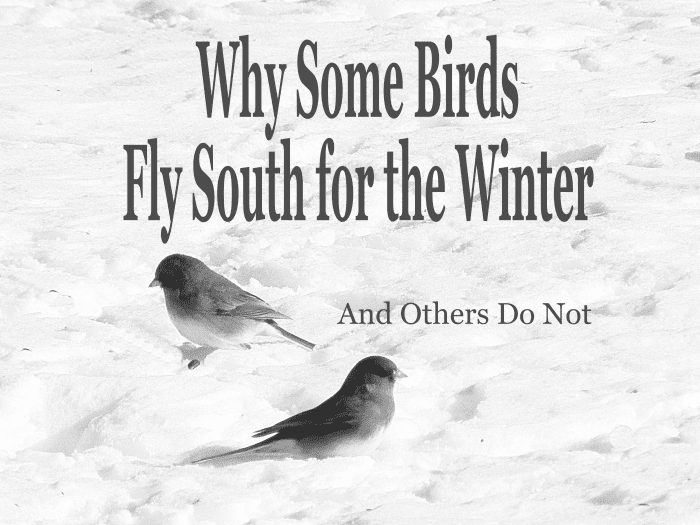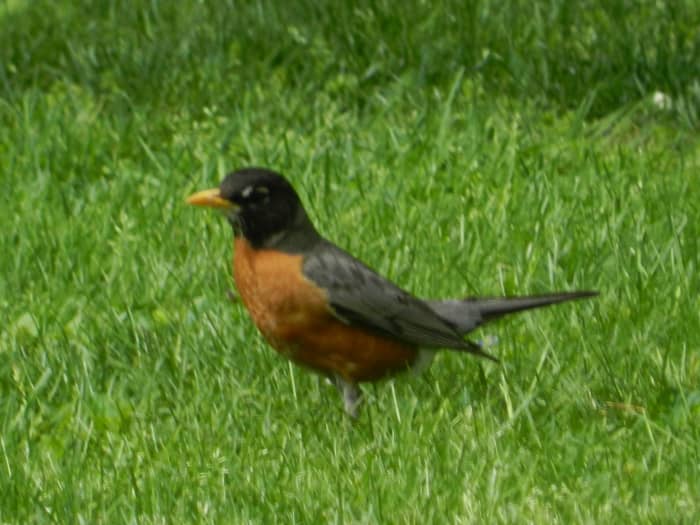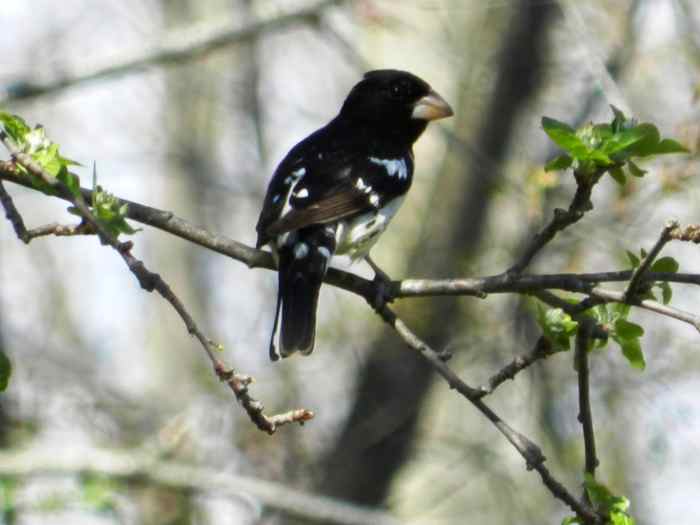Cole Porter Spring Again Birds on the Wing Again
Eric is an amateur birder and photographer who is amazed by the natural world just most every day.

Why do some birds fly s for the wintertime while others stay to brave the cold and snowfall?
The Coming of Winter
In the northern reaches of the United States, just before the leaves start to fall, birds brainstorm to flock together and prepare for their annual migration south. Birds that nosotros normally come across solitary or in small-scale groups during summer months will gather with others of their kind, or oft with those of other species. Waterfowl will besiege and form that well-known Five pattern in the sky as they journey to warmer climes.
American robins vanish, not to return until the spring, reminding u.s.a. that a long, cold winter is begetting down on the states. As ominous as the dirge of some decease knell, when the birds start to leave we know the sugariness warmth of summer is but a memory.
But non all birds wing south. Some remain through the snowfall and the cold, and some species are fifty-fifty more than abundant during the wintertime months. Why practice some birds fly due south while others stay put? Why do some announced to thrive in the snow? When birds drift, where do they go, what practise they do, and how do they decide when it's time to come dorsum?
And how the heck do they know where they are going?
These are some of the things I ponder each winter equally I watch the piffling black-capped chickadee dart effectually my birdfeeder, and wonder where the rose-breasted grosbeak has gone. So let's find out why birds fly due south for the winter!

The American robin is a migratory bird that is seen equally a first sign of spring in many parts of N America.
Why Do Birds Fly South?
It seems logical that the reason many birds spend the winter months in more than pleasant, southern locations might have something to practice with the warmth of the sun. This isn't exactly the case. Birds can and do survive extremely harsh winters. Like virtually migratory animals, the chief reason for moving is food.
In the summertime, food is abundant in northern climates because insects are active and plants and trees are flourishing. When it comes time to brood, birds desire to be where they have the best shot at finding food for themselves and their chicks. When it becomes difficult or incommunicable to detect food, it's time to go to warmer climates where food is notwithstanding plentiful.
For example, in northeastern states, the American Robin volition arrive in the spring and leave one-time in the early fall. Robins swallow worms, beetles, grubs, and other such insects, which they aren't going to notice in the common cold and snowfall. You lot'll never see a robin at your bird feeder; they volition not swallow foods that sustain another birds. They need to wing south, or they will starve.
Ducks, geese, and other waterfowl are other proficient examples. Their lakes and ponds freeze, making it extremely difficult to survive in their intended environment. To observe acceptable food, escape predation, and maintain their healthy quality of life they'll motility on to warmer climates. They fly in that V pattern to conserve energy, and to improve communication betwixt birds. However, sometimes waterfowl are known to overwinter in common cold climates when they are overfed by humans.
How Practice Birds Know When it Is Time to Fly South?
Scientists say birds probable have an innate response to the reduction in daylight hours, signaling to them that winter is near and they'd amend go moving. This is why, no thing how much you stock your bird feeder, many bird species are going to head southward but the same. The verbal day they start their journeying will be influenced by local conditions patterns, just information technology is the daylight that gives them the indicate to migrate.

The rose-breasted grosbeak will fly south for the winter, and may drift equally far every bit South America.
Why Do Some Birds Stay Through the Winter?
Some birds don't seem to mind the winter. The black-capped chickadee, northern primal, blue jay, tufted titmouse, and others volition brave the most brutal cold and snowfall. Feathers are pretty good insulators, and most birds could make it through a harsh winter if they had to.
So if bravery isn't the reason birds stay through the winter, what is? Once again, the reason is their nutrition. Some birds don't need to rely on the plenty of summertime. They tin can forage for insects in the bark of trees and notice plenty food to make information technology through the cold, nighttime months. In fact, in some areas, even the American robin is known to stick around through the winter months, if it tin can find enough food.
Scroll to Go along
Read More From Owlcation
Other birds actually become more plentiful in winter. The dark-eyed junco is an example of a bird that will happily inhabit areas other birds have vacated in the winter months. In the Northeastern United States, Juncos volition movement down from their convenance grounds in Canada to overwinter in a comparatively milder climate.
If a bird is of a species that can find food in the winter, it has no demand to drift. Well-stocked bird feeders may help some species during periods of exceptionally harsh weather, but otherwise, the birds that stay through the snow and ice will know how to detect plenty food to survive.

The dark-eyed junco spends its winters in the United States and migrates to Canada for the summer months.
Where Do Birds Go When They Fly South?
When the birds leave the northern states, where do they go, and how do they know how to get in that location? Many migrating birds observe their way to Mexico or Florida, overwintering in tropical climes. Others simply need climates where the food is arable enough to sustain them.
How exercise migrating birds know where they are going?
Remarkably, birds seem to possess innate knowledge that helps them to negotiate their long migrations. They are believed to navigate past the sun during the day, and the moon and the stars at night.
There is too some enquiry that says they are enlightened of magnetic fields in the earth and use them to detect their way. It's a kind of internal GPS, and one of the more impressive abilities in the animal kingdom.
The side by side question is one you may ask of people who motion to Florida in the winter: Why do they come dorsum? Of course, we tin't speak for the people, but for the birds, over again, it's hardwired into their systems. When daylight hours begin to lengthen, birds know information technology's future back to their convenance grounds.
Like many animate being behaviors, the whole ordeal is naturally designed to facilitate the survival of the species through procreation.

The bluish jay sticks it out through the snowy winter .
The Amazing Bird Migrations
Birds are everywhere. They're piece of cake to take for granted, just they really are wonders of nature. The deeper ane digs into their behaviors the more interesting they go. This commodity dealt with Northward American birds, but there are some astonishing bird facts from effectually the world.
For example: Did yous know the bar-tailed godwit migrates from China to New Zealand in one flight, a distance of over 5,500 miles?
That's crazy!
Now yous know a little more nearly why birds fly due south, what they do when they get there, and why some are brave enough to stay through the winter.
Resource and Further Reading
As always, the following resource were key in the creation of this article:
- Cornell Lab of Ornithology
- National Audubon Society
This content is accurate and true to the best of the author'due south knowledge and is non meant to substitute for formal and individualized communication from a qualified professional.
Just a student on May 06, 2019:
I'thousand using this for a inquiry paper. This made it a lot easier. Kudos to you.
Eric Dockett (writer) from USA on November 20, 2015:
Thanks Kristen!
Kristen Howe from Northeast Ohio on November xix, 2015:
Eric, this was a real interesting hub on bird migration in the winter. I really enjoyed information technology and learned some good facts about it. Thanks for sharing.
Eric Dockett (author) from U.s. on Oct 23, 2015:
Give thanks you Suhail, and to your dog besides. :-)
Suhail Zubaid aka Clark Kent from Mississauga, ON on October 22, 2015:
Very educating indeed. I liked the mode you wrote it.
Hope to read many more from you!
Source: https://owlcation.com/stem/Why-Some-Birds-Fly-South-for-the-Winter-and-Others-Do-Not
0 Response to "Cole Porter Spring Again Birds on the Wing Again"
Post a Comment